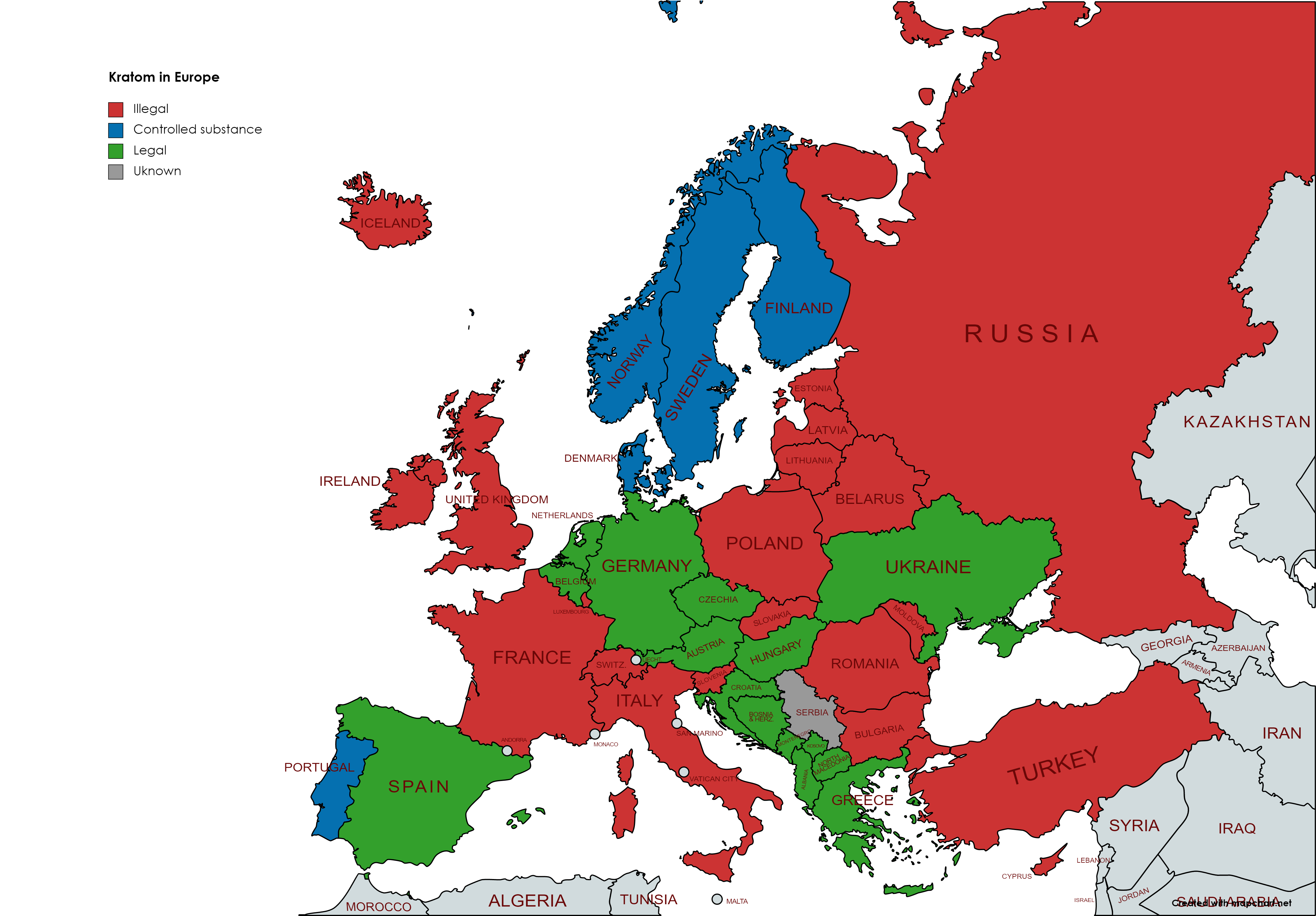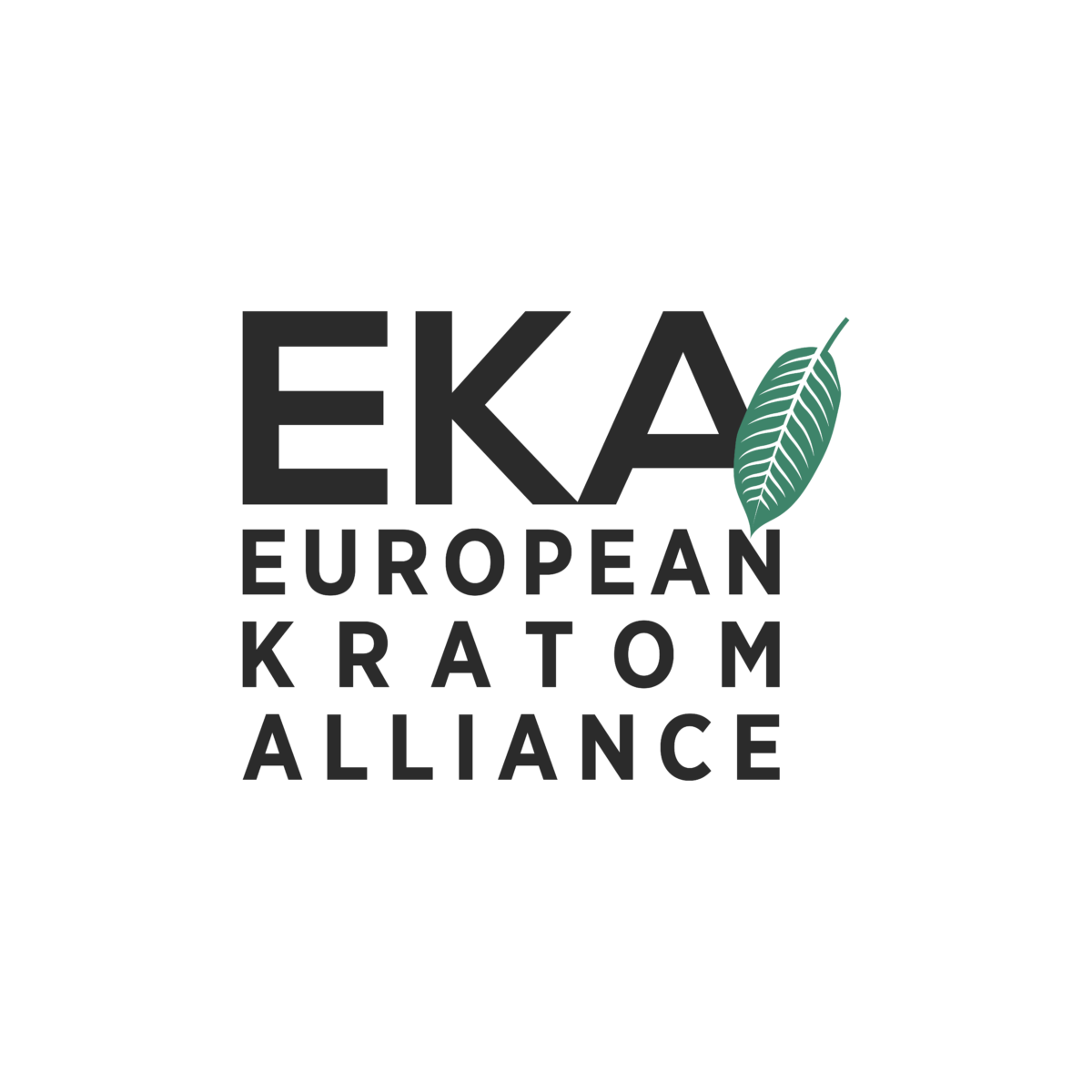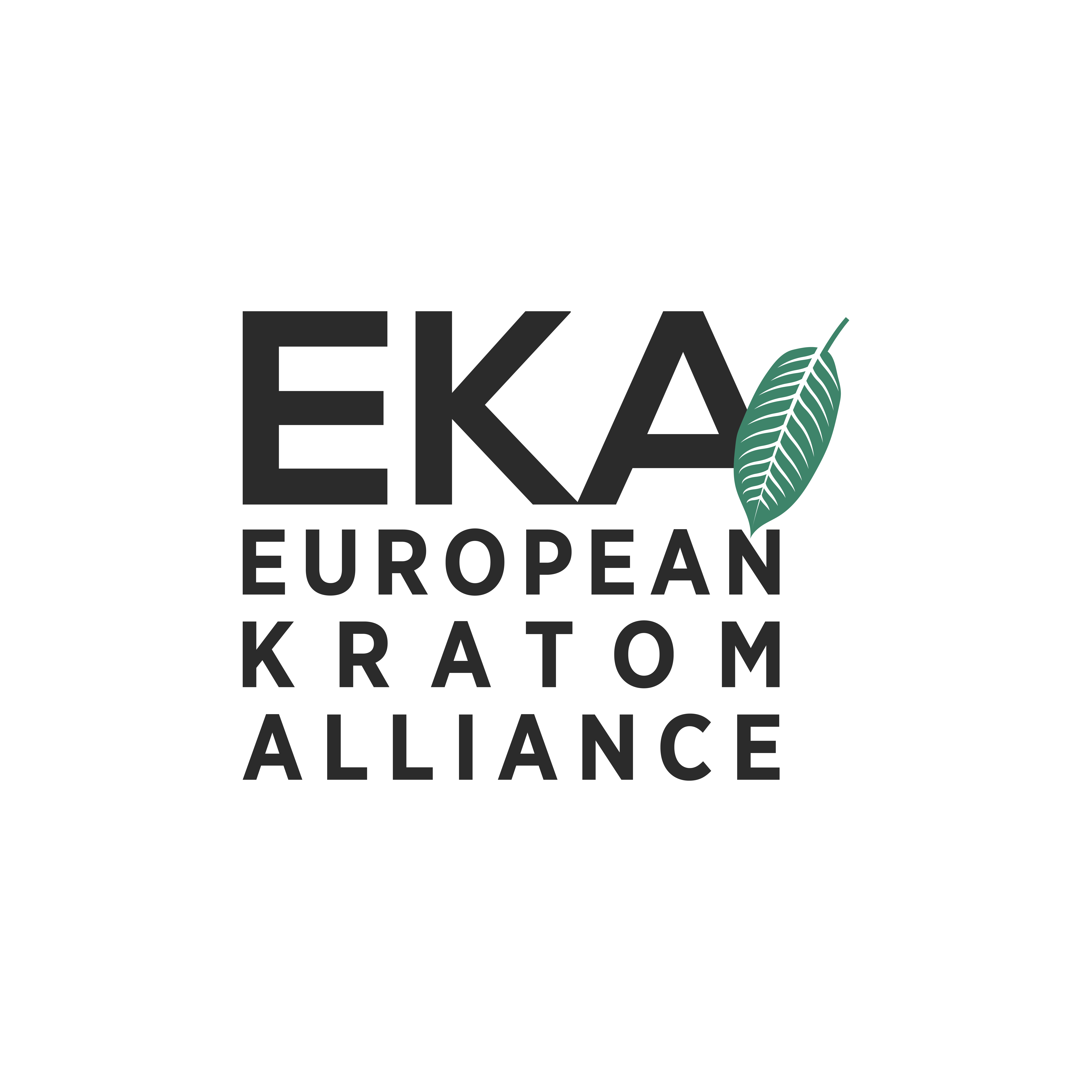Legality of Kratom across Europe varies from country to country
Welcome to the comprehensive guide on the legality of kratom in Europe, a continent marked by its intricate legal landscape. As we delve into the status of kratom across European countries, it’s essential to navigate the complex web of regulations governing substances on this continent.
In Europe, the legal status of substances is diverse, reflecting the intricate tapestry of laws from country to country. To understand the legal framework, it’s crucial to grasp three key terms:
Unregulated Substances(Legal): These are substances that lack specific legal restrictions or regulations, allowing for their possession and use without legal consequences. However, the absence of regulation doesn’t imply safety or endorsement.
Controlled Substances: Referring to drugs under regulatory control, these substances are subject to specific rules and restrictions due to their potential for abuse or dependence. Controlled substances often have authorized uses, such as medicinal applications, but are governed by strict regulations.
Prohibited Substances: In contrast, prohibited substances are expressly forbidden by law. Possession, use, or distribution of these substances is illegal, and penalties can be severe.
This page serves as a guide to navigating the nuanced legality of kratom in Europe. Given the dynamic nature of legislative changes, we commit to updating this document annually to provide the most accurate and current information. Join us on this exploration of the legal intricacies surrounding kratom in the diverse legal landscape of Europe
.

If you do find our registry to be incomplete, we would appreciate it if you would be so kind to send us an e-mail.
Albania: unregulated
Kratom is currently not a controlled substance; thus, it is legal.
Andorra – no information
Austria: unregulated
Kratom is currently not a controlled substance; thus, it is legal.
Belarus: unregulated
Kratom itself is included in the list of prohibited narcotic drugs and psychoactive substances, and thus it is illegal. (National list of narcotic drugs, psychotropic substances and their precursors, subject to State control in the Republic of Belarus, Decree No. 26 of 28 May 2003). (https://pravo.by/document/? guid=12551&p0=W21529651&p1=1).
Belgium: unregulated
Kratom is currently not a controlled substance; thus, it is legal.
Bosnia and Herzegovina: unregulated
Kratom is currently not a controlled substance; thus, it is legal.
Bulgaria: illegal
Kratom itself has been banned since 2011 by the Regulation on classification of plants and substances as narcotics.(https://www.mh.government.bg/media/filer_public/2015/06/19/naredba-red-za-klasifitsirane-na-rasteniyata-i-veshtestvata-
kato-narkotichni-08-11-2013.pdf).
Croatia: illegal
Kratom itself and its other main component mitragynine are included in the list of drugs, substances, psychotropic substances, and plants used for making drugs (Decree 293/2011 – Regulation on classification of plants and substances as narcotics). Using drugs for personal use only is, however, not a criminal act but instead is treated as a misdemeanor that can lead to a financial penalty.
(https://narodne-novine.nn.hr/clanci/sluzbeni/2019_02_13_259.html)
Czech Republic: legal
Kratom is currently in the process of being regulated, but it is legal.
Denmark: controlled substance / illegal
Kratom and its main components, mitragynine and 7-hydroxymitragynine, are classified as controlled substances, and thus their sale, importation, possession and use are prohibited (Executive Order 174 amending Act on Euphoric Substances). The Danish Medicine Agency can authorize a permission for persons, companies, laboratories and institutions in special circumstances. (https://www.retsinformation.dk/eli/lta/2009/174)
Estonia: illegal
Kratom itself and its other main component, 7-hydroxymitragynine, are included in the list of prohibited narcotics and psychotropic substances and thus are illegal.
(https://www.riigiteataja.ee/aktilisa/1050/6201/5006/SOM_m28_lisa.pdf)
Finland: controlled substance
Kratom itself is classified as a psychoactive substance by the Decree on prohibited psychoactive substances on the consumer market (1130/2014). Therefore, in accordance with article 44 of the criminal code, it is prohibited to import, store, or sell Kratom. Possession and use, however, are not punished acts.(https://www.finlex.fi/fi/laki/ajantasa/2014/20141130)
France: illegal
Kratom and its main components mitragynine and 7-hydroxymitragynine are included in the list of psychotropic
substances and thus are illegal (Arrêté du 22 février 1990 fixant la liste des substances psychotropes, Annex).(https://www.legifrance.gouv.fr/loda/id/JORFTEXT000000533087/)
Germany: legal
Kratom is legal as long as the labeling of the products mentions that it is not to be used for human consumption. Not listed in the German Narcotics Act (BtMG) nor under special control in the Medicinal Products Act (AMG) and links (https://www.gesetze-im-internet.de/btmg_1981/BJNR106810981.html https://www.gesetze-im-internet.de/amg_1976/BJNR024480976.html)
Greece: unregulated
Kratom is not currently a controlled substance; thus, it is legal.
Hungary: unregulated
Kratom is not currently a controlled substance; thus, it is legal.
Iceland: illegal
Kratom itself is a controlled substance and thus it cannot be imported, sold, possessed or used in Iceland in accordance with the Amendment of the the Act 93/1994.(https://www.lyfjastofnun.is/media/voruflokkun/Listi_til_birtingar_a_ve f_jurtir.pdf)
Ireland: illegal
The main components of kratom (mitragynine and 7-hydroxymitragynine) are prohibited under the Statury Instrument 173/2017 on the Misuse of Drugs.(https://www.irishstatutebook.ie/eli/2017/si/173/made/en/print)
Italy: illegal
Kratom itself and its other main component mitragynine are currently enlisted under the Table of narcotic drugs and psychotropic substances and therefore are currently illegal. (https://www.trovanorme.salute.gov.it/norme/dettaglioAtto? id=55669)
Kosovo: unregulated
Kratom is not currently a controlled substance; thus, it is legal.
Latvia: illegal
Kratom and its main component mitragynine and 7-hydroxymitragynine are is classified as psychoactive substances by Regulation 847 Regarding Narcotic Substances, Psychotropic Substances and Precursors to beControlled, and thus are currently prohibited. (https://www.vvc.gov.lv/en/laws-and-regulations-republic-latvia-english/cab-reg-no-847-regulations-regarding-narcotic-substances-psychotropic-substances-and-precursors-be-controlled-latvia-amendments-10102017utm_source=https%3A%2F%2Fwww.google.com%2F)
Liechtenstein no information
Lithuania: illegal
Kratom itself and extract of kratom are included in the List of narcotic drugs and psychotropic substances, and thus are currently prohibited. (https://e-seimas.lrs.lt/portal/legalAct/lt/TAD/TAIS.94030/jJMLdJFMGr)
Luxembourg: illegal
Kratom and its main components mitragynine and 7-
hydroxymitragynine are classified as psychotropic substances, and are currently prohibited.
(https://legilux.public.lu/eli/etat/leg/rgd/2012/07/21/n7/jo)
Malta: unregulated.
Kratom is not currently a controlled substance; thus, it is legal.
Moldova: illegal
Kratom itself is included in Table II of Narcotic substances and psychotropic substances not used for medical purposes, and therefore it is prohibited. (https://www.legis.md/cautare/getResults? doc_id=20755&lang=ro)
Monaco no information
Montenegro: unregulated
Kratom is not currently a controlled substance; thus, it is legal.
Netherlands: unregulated
Kratom is not currently a controlled substance; thus, it is legal.
North Macedonia: unregulated
Kratom is not currently a controlled substance; thus, it is legal.
Norway: controlled substance / illegal
Kratom and its main components mitragynine and 7-hydroxyKratom itself is a controlled substance in accordance with the Regulation on drug classification, and it is a criminal offense to import, export, sell, purchase, distribute, possess, produce, or process kratom. However, doctors are allowed to describe kratom as a medicine in special occasions. (https://lovdata.no/dokument/SFO/forskrift/1999-12-27-1565)
Poland: illegal
Kratom is enlisted in Annex 1 of the Act on counteracting drug addiction under prohibited narcotic drugs and therefore it is illegal. https://isap.sejm.gov.pl/isap.nsf/download.xsp/WDU20180001591/ O/D20181591.pdf
Portugal: controlled substance
Kratom and its main components mitragynine and 7-hydroxymitragynine are listed as prohibited psychoactive substances in accordance with Ordinance 154/2013, and thus selling or importing them is illegal. However, possession is not criminalized.(https://diariodarepublica.pt/dr/detalhe/portaria/154-2013-260421)
Romania
Kratom itself has been prohibited since 2010 by the Emergency Order n6 of February 2010 amending the Law 143/2000.
(https://legislatie.just.ro/Public/DetaliiDocument/116209)
Russia
The main components of kratom (mitragynine and 7-hydroxymitragynine) have been illegal since 2011, by Decree 822/201
San Marino no information
Serbia: illegal
Kratom itself has been included in the list of banned drugs since 2022, and therefore it is illegal.
(https://www.pravno-informacioni-sistem.rs/SlGlasnikPortal/eli/rep/sgrs/ministarstva/pravilnik/2022/73/1)
Slovakia: illegal
Kratom itself is enlisted as a prohibited psychotropic substance in the Act on Narcotic Substances, Psychotropic Substances and Preparations Act 139/1998, and therefore it is illegal. (https://www.epi.sk/zz/1998-139)
Slovenia: illegal
Kratom itself is enlisted as a psychoactive substance by the Regulation on the classification on illicit drugs, and therefore it is illegal. (https://www.epi.sk/zz/1998-139)
Spain: unregulated
Kratom is not currently a controlled substance; thus, it is legal
Sweden: controlled substance
The main component of kratom (mitragynine) is mentioned in the Regulation 1992:155 and it is classified as a psychoactive substance. Thus, it is illegal to produce or prepare the product for human consumption. The consumption itself is also forbidden. However, kratom can be imported and sold for soap making.(https://www.riksdagen.se/sv/dokument-och-lagar/dokument/svensk-forfattningssamling/forordning-19921554-om-kontroll-av-narkotika_sfs-1992-1554/)
Switzerland: illegal
Kratom has been banned since 2017 by the Narcotics Act, Appendix, and therefore it is illegal. (https://www.gesetze-im-internet.de/btmg_1981/)
Turkey: illegal
Kratom and its components is included in the list of psychoactive substances by the Decree 2013/5742, and thus it has been illegal since 2014. (https://www.resmigazete.gov.tr/eskiler/2014/01/20140125-3-1.pdf)
Ukraine: unregulated
Kratom is not currently a controlled substance; thus, it is legal.
United Kingdom: illegal
With the entry into force of the 2016 Psychoactive Substances Act, Kratom became banned in the United Kingdom(https://www.legislation.gov.uk/ukpga/2016/2/contents/enacted)

